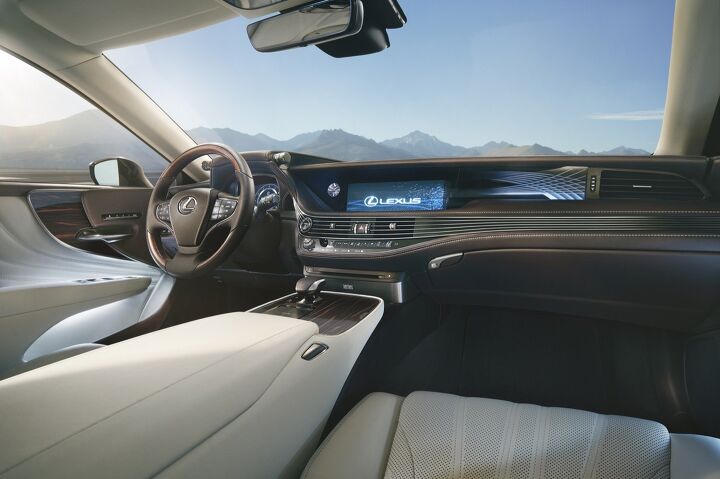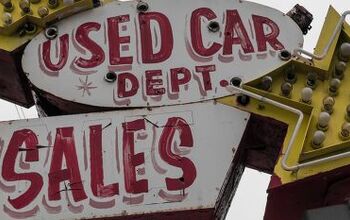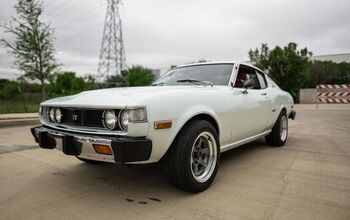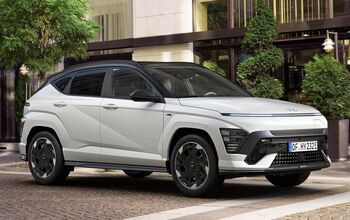Toyota Expects Lexus LS Sedan Sales to Take Off Again, but Not Nearly to Historic Levels
Timing is tough.
Toyota’s Lexus luxury marque launched the fourth-generation Lexus LS for the 2007 model year, just prior to an economic collapse that was followed up by an anti-car/pro-SUV shift. Lexus, which averaged more than 25,000 annual U.S. sales of its LS flagship sedan during its third generation and then topped 35,000 sales in 2007, suddenly found itself struggling to top the 10K marker.
As the fourth-gen LS’s tenure came to an end, Lexus watched as demand for the LS quickly collapsed. From fewer than 11,000 sales in 2013 and fewer than 9,000 in 2014 to barely more than 7,000 in 2015 and only 5,514 in 2016, the once hugely successful Lexus LS — a former leader of America’s large luxury sedan class and the car that was responsible for the genesis of Lexus — became an afterthought.
The fifth-generation Lexus LS is set to go on sale this winter, and Lexus expects to see a huge increase in demand for the new car in 2018. Lexus does not, however, expect the LS to generate anything like the kind of interest the big sedan did prior to the proverbial global financial crisis.
According to Automotive News, which says the 2018 Lexus LS500 will be priced around $76,000 (up by roughly $2,500 compared with the MY2017 LS), Lexus anticipates U.S. sales of roughly 1,000 per month with the new model.
Over the last year, Lexus has averaged around 500 LS sales per month.
Doubling volume would be an impressive accomplishment, though that would only take the Lexus LS back to approximately 12,000 annual sales, hardly the 27,400-unit annual average Lexus produced in the half-decade before the recession. Times, of course, have changed. BMW sold 17,500 copies of the 7 Series per year between 2003-2007 but now averages 10,800 per year. The Mercedes-Benz S-Class averaged 23,300 annual U.S. sales between 2003-2007 but now averages 18,200 per year. Jaguar used to sell 7,700 XJs per year but now sells 4,400 annually.
It’s a segment-wide curse, in other words, one that’s been followed by an industry-wide blessing. These brands all sell boatloads of SUVs/crossovers now, vehicles that have effectively replaced large luxury sedans in many driveways.
So how will Lexus deliver on its forecast? “We do expect to attract people from different brands who may have drifted away,” says Lexus’ marketing general manager, seemingly acknowledging that the outgoing Lexus LS didn’t do enough to keep buyers in the fold. The new LS adopts a longer, lower, wider appearance that emphasizes its non-SUV bodystyle, and Lexus says the brand has taken on a more performance-oriented tone, not wanting the LS to be seen merely as the sedate and cautious choice.
This isn’t the first time Lexus has been forthright with its sales expectations for a new car. The Lexus LC, with which the LS shares its turbocharged V6 and ten-speed automatic, was intended to attract 400 U.S. buyers per month. But after doing so in its first two months on the market, LC sales slid to 313 in July and 291 in August, its fourth month of availability. On the other hand, Lexus was ready to sell 2,200 copies of the entry-level NX crossover per month and ended up more than doubling that figure.
[Image: Toyota Motor Corp.]
Timothy Cain is a contributing analyst at The Truth About Cars and Autofocus.ca and the founder and former editor of GoodCarBadCar.net. Follow on Twitter @timcaincars and Instagram.
More by Timothy Cain
Latest Car Reviews
Read moreLatest Product Reviews
Read moreRecent Comments
- Namesakeone If I were the parent of a teenage daughter, I would want her in an H1 Hummer. It would be big enough to protect her in a crash, too big for her to afford the fuel (and thus keep her home), big enough to intimidate her in a parallel-parking situation (and thus keep her home), and the transmission tunnel would prevent backseat sex.If I were the parent of a teenage son, I would want him to have, for his first wheeled transportation...a ride-on lawnmower. For obvious reasons.
- ToolGuy If I were a teen under the tutelage of one of the B&B, I think it would make perfect sense to jump straight into one of those "forever cars"... see then I could drive it forever and not have to worry about ever replacing it. This plan seems flawless, doesn't it?
- Rover Sig A short cab pickup truck, F150 or C/K-1500 or Ram, preferably a 6 cyl. These have no room for more than one or two passengers (USAA stats show biggest factor in teenage accidents is a vehicle full of kids) and no back seat (common sense tells you what back seats are used for). In a full-size pickup truck, the inevitable teenage accident is more survivable. Second choice would be an old full-size car, but these have all but disappeared from the used car lots. The "cute small car" is a death trap.
- W Conrad Sure every technology has some environmental impact, but those stuck in fossil fuel land are just not seeing the future of EV's makes sense. Rather than making EV's even better, these automakers are sticking with what they know. It will mean their end.
- Add Lightness A simple to fix, strong, 3 pedal car that has been tenderized on every corner.



































Comments
Join the conversation
The LC500 and LS500 do not share the same engine. The LC uses the 5.0 V8 while the LS has exclusive rights to the new turbo V6... for now.
As multiple LS owner, I'm disappointed there's no V8 in the new car. Because I prefer a V8 in a top shelf luxury car and because Lexus makes some of the finest V8s available. What a shame...